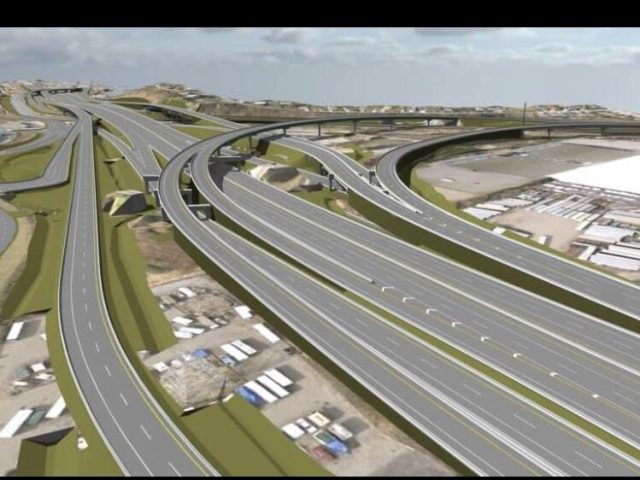President Nana Addo Dankwa Akufo-Addo has inaugurated the second phase of the Tema Motorway Roundabout project, a critical infrastructure development aimed at alleviating traffic congestion at the bustling intersection that connects Accra to Tema, Ghana’s industrial hub.
The newly commissioned interchange, part of a broader rehabilitation and expansion of the 19.5-kilometer Accra-Tema Motorway, marks a significant step in transforming the corridor into a modern 10-lane divided highway.
The scope of work on the second phase of the project include three span continuous steel girder bridge measuring 142 metres long, a steel box frame pier supported on a five metre diameter caisson pile 15 metres deep, mechanically stabilised retaining-wall combined abutment, and drawing and safety facilities including street lights and other road ancillary works.
It brings to three the number of interchanges inaugurated by the President in the Greater Accra Region over the last two weeks following the Flower Pot and Obetsebi Lamptey interchanges.
Enhancing urban mobility and trade
Speaking at the commissioning ceremony, President Akufo-Addo highlighted the strategic importance of the Accra-Tema Motorway, which has served as a vital transportation link for nearly six decades, facilitating regional trade and connecting Ghana to the West African sub-region.
“Road infrastructure is the backbone of the nation’s progress,” the President said. “Giving Ghana’s busiest Motorway a facelift is fundamental to accelerating socio-economic advancement.”
The Tema Motorway Roundabout Phase II project, which began in July 2022, involved constructing a third-tier flyover to further ease traffic flow at the intersection.
This follows the successful completion of Phase One in June 2020, which converted the roundabout into a two-tier intersection, funded by a $91 million Japanese grant through the Japan International Cooperation Agency (JICA).
Decentralising economic opportunities
President Akufo-Addo underscored the broader objectives of the project as part of a national policy to decentralize economic activities, improve urban mobility, and foster equitable development.
“From the Pokuase Interchange, the largest in West Africa, to the Tamale Interchange, the first of its kind in northern Ghana, we have worked tirelessly to open up our country, reduce disparities, and empower communities,” he stated.
The government, he added, has laid the foundation for a resilient, economically vibrant, and inclusive Ghana, emphasizing its successes in infrastructure, education, and healthcare.
Global and regional implications
A 2023 World Bank report noted that increasing urban population and vehicle ownership have exacerbated commuting times and air quality issues in developing countries. Infrastructure projects like the Tema Motorway Interchange are crucial for promoting sustainable urban growth and enhancing regional trade integration.
The President emphasized that reducing bottlenecks on highways such as the Accra-Tema Motorway is critical to Ghana’s economic integration within the Economic Community of West African States (ECOWAS).
Govt commitment to road infrastructure
The Minister of Roads and Highways, Francis Asenso-Boakye, lauded the Japanese government for its generous support and pledged the government’s continued commitment to improving roads connecting the Tema Motorway Interchange, including the Tema-Aflao road.
“The commissioning of the Tema Motorway Roundabout Phase II is a testament to Ghana’s dedication to fostering efficient transportation systems, decentralizing economic activities, and achieving sustainable urban development.
“As the President aptly noted, the project represents not just an infrastructural achievement but a transformative step toward a brighter, interconnected future for Ghana,” he stressed.








































